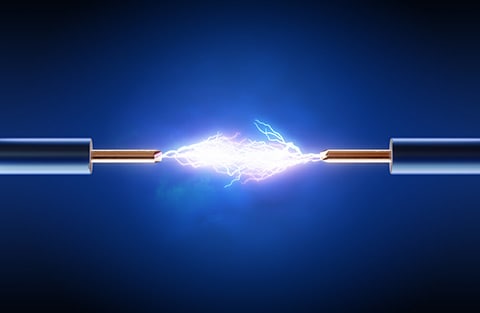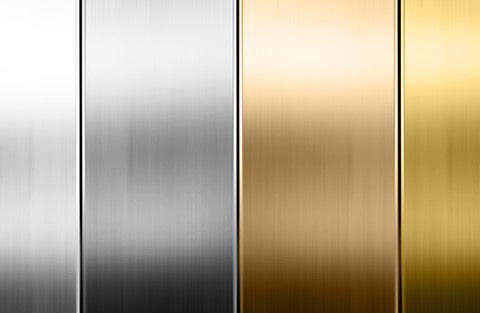Conductive metals are those that allow an electric current to flow through them. The degree of conductivity any metal has depends on its electron concentration and the mobility of the electrons. Since energy transfer is strongest when there is the least amount of resistance, the best conductors of electricity are metals that have the most free electrons.
Metals conduct electricity through metallic bonding. In contrast to most other kinds of matter, metallic bonds feature metal atoms that are surrounded by a large, constantly moving body of electrons that are not linked to a specific atom. These delocalized electrons can move and repel one another in the direction of an electric current, conducting electricity throughout the metal.
Why Are Metals Good Conductors of Electricity?
The best conductors of electricity are metals with the most free electrons. Compared to other substrates, metals make the best conductors of electricity because they contain the highest number of free electrons in their atomic structure. Instead of being tightly bound to a nucleus, the electrons within metals are free and move around easily. When voltage is applied, the electrons collide with one another, carrying heat and electric current throughout the metal.
Types of Conductive Metals
Many types of metal conduct electricity, including copper, bronze, brass, silver, aluminum, steel, nickel, and gold. However, silver, copper, and gold are the most conductive metals, allowing electricity to flow through them with the least resistance. While all of these materials are used in electrical and power transmission applications, metals like silver and gold can be cost-prohibitive for certain uses.
Copper is a widely used material for electrical wiring and equipment applications since it offers high conductivity coupled with affordability. Brass, a metal alloy that combines copper and zinc, also conducts electricity well, is affordable, and is used in a variety of electrical applications.
Which Metal Is the Best Conductor of Electricity?
The number one best conductor of electricity is silver. Silver conducts electricity and heat most efficiently due to its unique crystal structure that allows electrons to move more freely than in other materials. A valence electron is a free electron in the outer shell of an atom that can travel along the metal’s physical structure. Silver has a single valence electron, which moves freely and with little resistance throughout the metal, conducting electricity easily.
Benefits of Conductive Metals
Conductive metals feature unique qualities that make them well-suited to a large number of applications. Since their metallic bonding is very strong, a large amount of energy is needed to break these bonds down. This translates to high melting and boiling points, which are useful when fabricating components for high-heat environments. Highly conductive metals also tend to be durable. Copper, for example, can endure harsh conditions without them affecting its integrity or strength.
Conductive metals are also good conductors of thermal energy, making them useful in applications that require both heat and electricity to be conducted efficiently. In challenging environments, many conductive metals perform reliably, making them well-suited to applications with high-performance demands, such as circuit breakers. Many of the products used in our daily lives would not exist without conductive metals. Everything from batteries to power lines and electrical wiring requires conductive metals to function.
Conductive Metal Applications
There are many industry-specific applications for conductive metals, especially those related to electronics, telecommunications, and aerospace. Some common applications that require the conduction of electrical currents include:
Home And Business Electrical Wiring
Electrical Circuits
Electrical Tracing
Conductive Coatings
Electrical Components
There are also many applications specific to each metal. For example, gold is used to create jewelry, electrical contacts, and electronic circuit boards. Silver is used to coat telecom conductors, and copper is widely used throughout the plumbing industry and in electrical wiring systems. Platinum is used to create catalytic converters.
In addition to these uses, conductive metals are frequently used in electroplating applications. During the electroplating process, an object is coated with a thin layer of a conductive metal. Brass, copper, gold, silver, and numerous other metals can be thinly applied to a substrate through a controlled electrolysis technique.
This process allows manufacturers to combine one material’s positive characteristics, such as its affordability or lightweight nature, with the electrical conductivity of another material. Electroplating is used on automotive components, to add resiliency to medical devices, to increase the conductivity of solar and electrical components, in antenna manufacturing, and much more.
Industries Served
Conductive metals are used throughout diverse industries, including:
When creating electrical products for any industry, better conductive properties translate to faster electrical systems, smaller equipment, and less waste heat. High-quality conductive metals are also used to enhance a product’s durability, performance, and cost-effectiveness. They are particularly important in electrical and telecommunications applications.
At Sequoia Brass & Copper, we serve metal fabrication industries as a domestic supplier of high-quality conductive metal materials. We obtain the highest quality brass, copper, bronze, and other nonferrous metals for use in a wide range of demanding applications. Our copper, brass, and bronze stock are available in numerous alloys, shapes, and diameters to meet diverse industry needs.
Conductive Metal Supply From Sequoia Brass & Copper
Conductive metals are used throughout numerous industries to create electrical systems, consumer products, conductive coatings, and much more. Each of these applications requires a material that matches its conductivity, strength, and cost requirements. At Sequoia Brass & Copper, we supply the best conductors of electricity, including copper, brass, and bronze.
We have over 30 years of experience sourcing hard-to-find alloys and provide the highest quality materials and customer service. Our warehouse in Hayward, California stocks a large inventory of conductive metals ready for immediate shipment at highly competitive prices. We also offer custom on-demand, in-house cutting to close tolerances. To learn more about our products and services, contact our team today.




